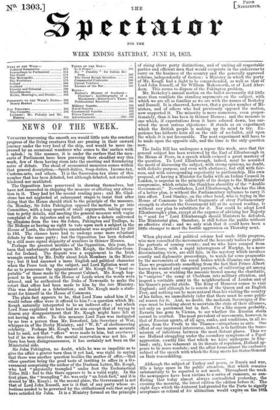When physical and political science had made little progress, wise
men consulted the movements of the heavenly bodies to gather the portents of coming events ; and we who have escaped from Francis Moore, with a rapid interregnum of Murphy, to a more discriminating view, are still fain, in the mystery which involves courtly and diplomatic proceedings, to watch for some prognostic by the movements of the royal bodies which illumine our sphere. Thus we prognosticate something from the fact that Prince Albert leaves his wonted and congenial pursuits, of cultivating art among the Mayors, or wielding the masonic trowel among the charitable, to "surprise" the camp at Chobham into military attention, and inspect a veritable army in the neighbourhood of London and of his Queen's peaceful abode. The King of Hanover comes to visit England; and although he is cousin of the Queen and an English Peer, and nothing can be more natural than his visiting the country of his father, we immediately infer that there must be some politi- cal reason for it. And, no doubt, the moderate Sovereigns of Eu- rope must be looking about to ascertain the state of their alliances, not only on parchment but in fact. For a like reason probably, Bavaria has gone to Vienna, to see whether the Russian storm cannot be averted. The most prevalent of movements, however, is that of Russian agents, of all ages, ranks, and conditions, in all re- gions, from the Pruth to the Thames—ubiquitous as ants. One effect of our improved intercourse, indeed, is to facilitate the trans- mission of infections between the most distant places. Thus we see Holland struggling under the secondary symptoms of a Papal aggression, exactly like that which we have undergone in Eng- land; only, less vehement in its threats of repulsion, Holland ap- pears to be more resolute ; and the affair forms almost the exclusive subject of the speech with which the King uieets his States-General on their reassembling.


























